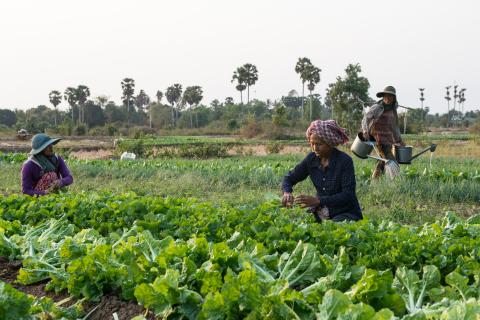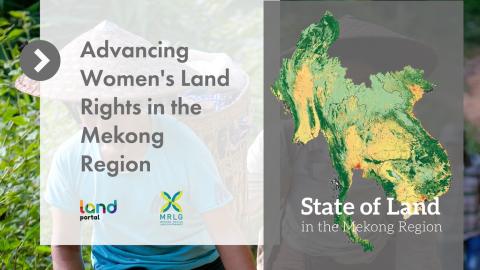Discover hidden stories and unheard voices on land governance issues from around the world. This is where the Land Portal community shares activities, experiences, challenges and successes.
 Follow our
Follow our
Sustainable Development Goals
Blog Series!
Interested in land corruption?
Follow our Land & Corruption Blog Series
for in-depth perspectives from the experts.
Issues
Geographical focus
As the voluntary carbon market (VCM) expands across forest-rich regions of the Global South, the Mekong region stands at a decisive crossroads. With accelerating climate commitments and the growing monetization of forest carbon, the stakes have never been higher for Indigenous Peoples and local communities.
Third Arab Land Conference Session Summary
Third Arab Land Conference Session Summary
The High-Level Session on Land Management in Times of Crisis at the Third Arab Land Conference convened policymakers, experts, and practitioners to explore how effective land governance can mitigate these challenges, prevent future conflicts, and drive resilience.
Third Arab Land Conference Session Summary
Third Arab Land Conference Session Summary
In a rapidly urbanizing Arab region facing pressing challenges such as climate change, land scarcity, forced displacement, and governance gaps, the Third Arab Land Conference convened in Morocco to chart a path forward. Ministers, international experts, and key stakeholders gathered to discuss sustainable land governance, investment-driven solutions, and inclusive policies to foster stability, economic growth, and social equity.
On January 23, 2025, the Land Portal Foundation and Mekong Region Land Governance (MRLG) convened a webinar to explore the evolving landscape of agricultural investments in the Mekong region. Experts from various sectors joined to discuss the impact of industrial crops, smallholder farmer integration into transnational value chains, and the resulting economic, environmental, and social transformations.
The webinar “Pathways to Customary Land & Forest Rights in the Mekong” took place on July 2nd, 2024. This was the second webinar in the series ‘State of Land in the Mekong region’ which aims to highlight the evolving environment of land governance in this dynamic region, including Cambodia, Lao PDR, Myanmar and Vietnam. The webinar attracted 240 participants and featured experts from the Mekong region.
A Recap of the Recent Land Portal-MRLG Webinar on Gender Equitable Land Governance in the Mekong Region
On Thursday 15 February, the Mekong Region Land Governance (MRLG) project and the Land Portal launched the first webinar in the State of Land in the Mekong series. The series, which will consist of three webinars across 2024 and 2025, aims to shine a spotlight on land issues in the Mekong region during a time of immense rural transformation.
This webinar took place on February 15th, 2024, under the title “Women’s Participation in Land Governance in the Mekong : Moving Beyond Quotas to Meaningful Inputs and Influence”. The webinar featured panelists from researchers to youth representatives and was jointly organized by the Land Portal Foundation and Mekong Region Land Governance (MRLG).
Sr. Elizabeth Daley, Independent freelance consultant and Chair of the Land Portal Foundation, moderated the panel, which featured the following speakers:
Maize is a key global cash crop, produced in every continent except Antarctica. As a flex crop, it has multiple uses including for direct human consumption, as an ingredient for animal feed, as a key component in processed foods, or in ethanol production. According to figures from FAOSTAT, global production increased from 0.2 to 1.2 billion tons between 1961 and 2020.
Curating land information is part of our daily work in the Land Portal. It includes selecting, categorizing, and enriching information with analysis and/or additional data, graphic visualizations, etc. In times with so much information available to choose from, people are increasingly seeking sources that offer selections of high-quality knowledge and provide analysis that make sense of it. Understanding how partners in the land community are meeting this demand is a great source for us to improve our work of curating, and providing meaning to land data.
No one asked them. No one even informed them. The first indicator the villagers had that something was happening in the Ar Yel Mountains was the arrival of men in construction hats.
At the beginning the disturbance was minimal; it was only one or two companies undertaking site explorations and tests. But by 2014, eight companies were “tearing the mountains apart” in their quest for manganese dioxide. That, said the villagers, was when the problems really began.










